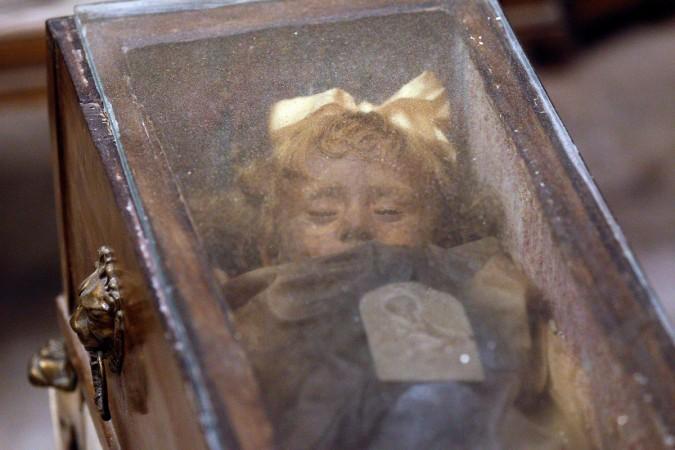
There is a mummy, that has been dead for almost a century now, in the Capuchin Catacombs at Palermo in Italy, which "blinks" at its visitors from time to time.
Yes, a mummy that blinks at its visitors. However, this Sicilian mummy is definitely not as menacing as the mummies portrayed in Hollywood movies. Instead, this one looks more like a little two-year-old girl, curled beneath her blanket, in an eternal sleep.
This mummy has been named the "Sleeping Beauty" by the locals, as she is so well-preserved by the embalming formula, that the researchers had a really difficult time figuring out what the formula was.
The Sleeping Beauty's real name is Rosalia Lombardo. Rosalia was only two years old, when she succumbed to pneumonia, in the year 1920. Not much is known about her life, but records show that a mortician called Alfredo Salafia had embalmed her.
The embalming skills of Salafia were so profound that when Rosalia died, her grieving father went straight to Salafia and asked him to make his daughter immortal. However, even Rosalia's father could not have thought that the embalming skills of Salafia would be as good as this.
Apart from being the most well-preserved mummy in the catacomb, Rosalia's "blinking" eyes have made her the most famous one at Capuchin Catacomb. While the other mummies were embalmed at the monasteries, Rosalia was embalmed by Salafia, whose embalming prowess seems to be as good as that of the Egyptians. Indeed, an MRI of Rosalia's body revealed that even her organs are well-preserved.
There are many theories that explain how Rosalia's eyes seem to blink from time to time, ranging from the little girl's spirit never leaving her body, to a sudden change in humidity, causing this phenomenon. However, the most prudent of these theories seem to be that it is an optical illusion.
"It's an optical illusion produced by the light that filters through the side windows, which during the day is subject to change," said Dario Piombino-Mascali, curator of the Capuchin Catacombs, to Archeology News Network. "They are not completely closed, and indeed they have never been."

















